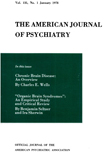Excessive Alcohol Use in Manic-Depressive Illness
Abstract
Of various factors the authors examined, only the excessive use of alcohol distinguished those manic patients with a history of hospitalization from those without one. Half of the hospitalized subjects had a history of an inordinate use of alcohol; this excessive use predominated during the manic phase, a fact that does not support the popular view that alcohol is used to counteract depression. Patients themselves frequently reported a deliberale use of alcohol to decrease manic symptoms and a tendency to shun alcohol during the depressive phase. Alcohol did not seem to alter the presenting symptoms of hospitalized manic patients, since irritability and the loss of impulse control were similar among the drinkers and nondrinkers.
Access content
To read the fulltext, please use one of the options below to sign in or purchase access.- Personal login
- Institutional Login
- Sign in via OpenAthens
- Register for access
-
Please login/register if you wish to pair your device and check access availability.
Not a subscriber?
PsychiatryOnline subscription options offer access to the DSM-5 library, books, journals, CME, and patient resources. This all-in-one virtual library provides psychiatrists and mental health professionals with key resources for diagnosis, treatment, research, and professional development.
Need more help? PsychiatryOnline Customer Service may be reached by emailing [email protected] or by calling 800-368-5777 (in the U.S.) or 703-907-7322 (outside the U.S.).



